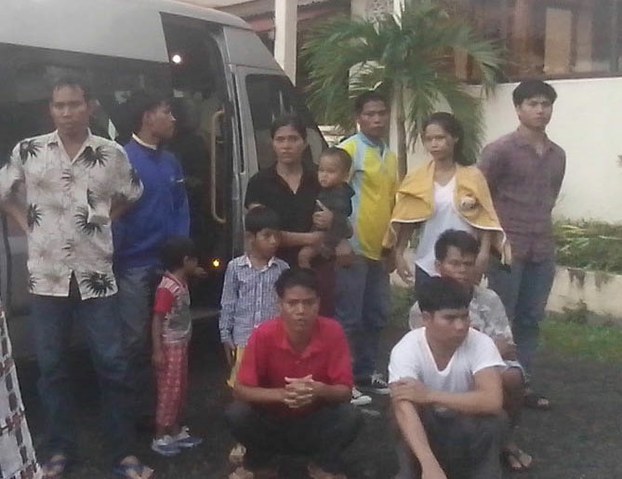A dozen Montagnards agree to repatriation from Cambodia to Vietnam
| Publisher | Radio Free Asia |
| Publication Date | 16 July 2015 |
| Cite as | Radio Free Asia, A dozen Montagnards agree to repatriation from Cambodia to Vietnam, 16 July 2015, available at: https://www.refworld.org/docid/55b1f84d15.html [accessed 19 May 2023] |
| Disclaimer | This is not a UNHCR publication. UNHCR is not responsible for, nor does it necessarily endorse, its content. Any views expressed are solely those of the author or publisher and do not necessarily reflect those of UNHCR, the United Nations or its Member States. |
2015-07-16
 A dozen Montagnards arrive at a checkpoint on the border with Vietnam in Cambodia's Ratanakiri province, July 16, 2015. Photo courtesy of Adhoc
A dozen Montagnards arrive at a checkpoint on the border with Vietnam in Cambodia's Ratanakiri province, July 16, 2015. Photo courtesy of Adhoc
A dozen ethnic Montagnards who sought refugee status in Cambodia willingly returned to their home country of Vietnam Thursday after Hanoi gave assurances it would not punish or discriminate against them, according to rights group and United Nations officials.
The 12 were part of a group of 31 Montagnards who fled neighboring Vietnam in April citing discrimination, and immediately crossed through Cambodia into Thailand to apply for asylum.
Fifteen members of the group returned to Cambodia's capital Phnom Penh and moved into the office of the United Nations refugee agency (UNHCR), but three of them voluntarily returned to their home in Vietnam's Central Highlands soon after.
Thursday evening, the dozen who had remained in the capital agreed to repatriation and were escorted to a checkpoint in northeastern Cambodia's Ratanakiri province on the border with Vietnam by police and U.N. staff, local rights group Adhoc provincial coordinator Chhay Thi told RFA's Khmer Service.
"They said they had left Vietnam for economic reasons, they wanted better living standards," he said.
"However, they couldn't wait for their cases to be processed [in Cambodia] as they were having difficulties enduring, so they volunteered to be repatriated to Vietnam."
Chhay Thi said that upon delivering the Montagnards to the border, U.N. officials obtained assurances from Vietnamese authorities that the group would not face persecution back home.
"The UNHCR cooperated with Cambodian authorities to repatriate the Montagnards and cooperated with Vietnam," he said.
"The U.N. set conditions with Vietnam stipulating that when the Montagnards return, there must be no prosecution. And the U.N. said that they will continue to monitor the Montagnards after they arrive at their hometowns."
Vivian Tan, spokeswoman for the U.N. Office of the United Nations High Commissioner for Refugees in Bangkok, confirmed to RFA that the Montagnards were returned to Vietnam only after they had volunteered to go.
"At their request and on an exceptional basis, we are facilitating the return of 12 Montagnard asylum-seekers to Vietnam's Central Highlands after verifying that they had opted for it voluntarily," she said in a statement.
"The government of Vietnam has agreed to receive them and given assurances that it will not discriminate against or punish them. It has also provided assurances that UNHCR will be able to visit them after their return home."
Flood of refugees
Nearly 200 Christian indigenous Montagnards have entered Cambodia illegally from Vietnam's Central Highlands since late last year, claiming they are fleeing political and religious persecution in their home country.
Most have hidden in the forests of remote Ratanakiri province, surviving on the assistance of local villagers.
While scores have emerged from their jungle hideouts with the assurance of protection from the UNHCR, others have been caught by local authorities and deported back to Vietnam.
The UNHCR said in June that 116 people were awaiting registration for asylum in Phnom Penh.
Also last month, New York-based Human Rights Watch released a report detailing how Montagnards in Vietnam are subject to constant surveillance, intimidation, arbitrary arrest and mistreatment in custody.
The group's report said such persecution "reflects broader rights violations against religious minorities" in the country.
Reported by Ratha Visal and Samean Yun for RFA's Khmer Service. Translated by Samean Yun. Written in English by Joshua Lipes.
Link to original story on RFA website
